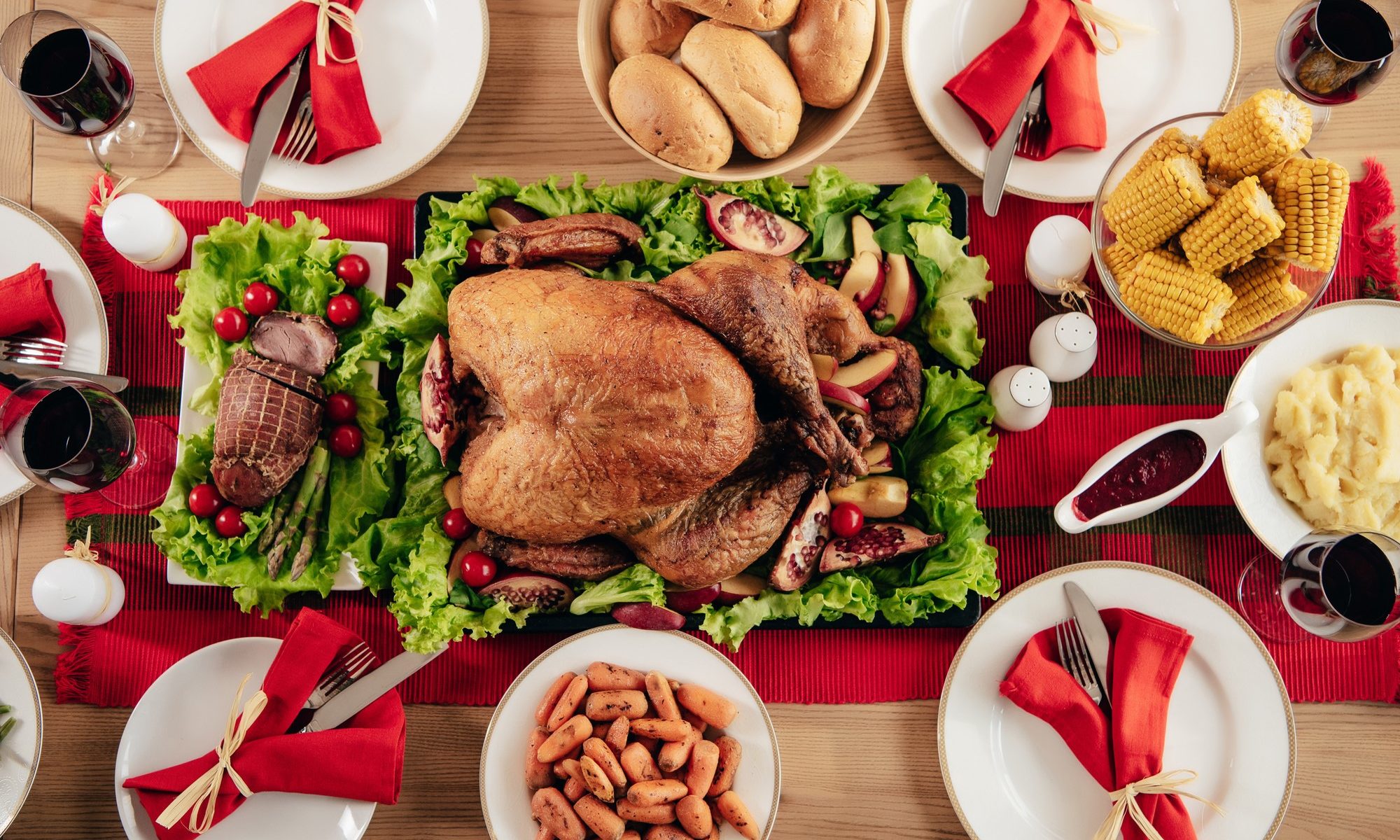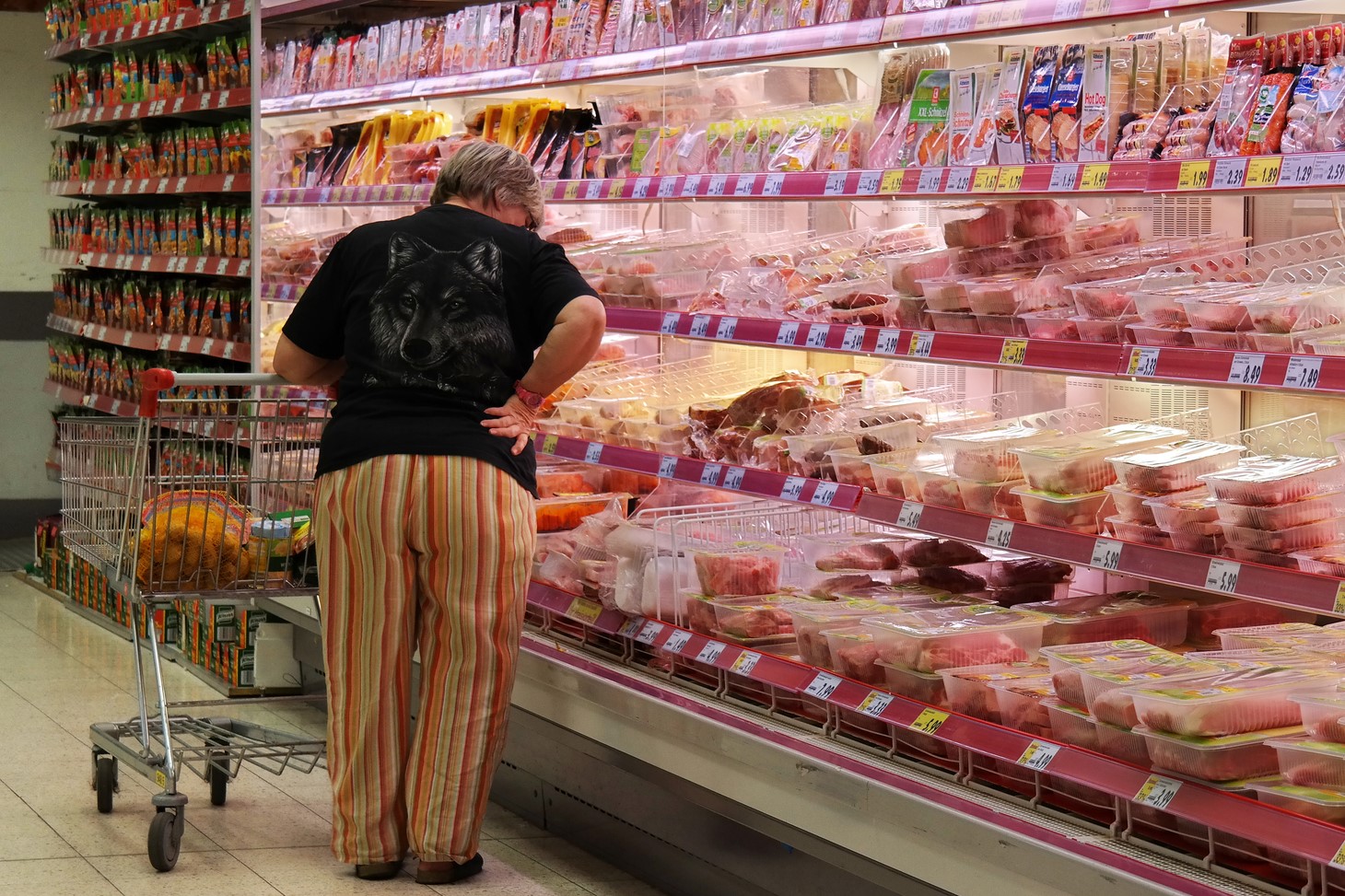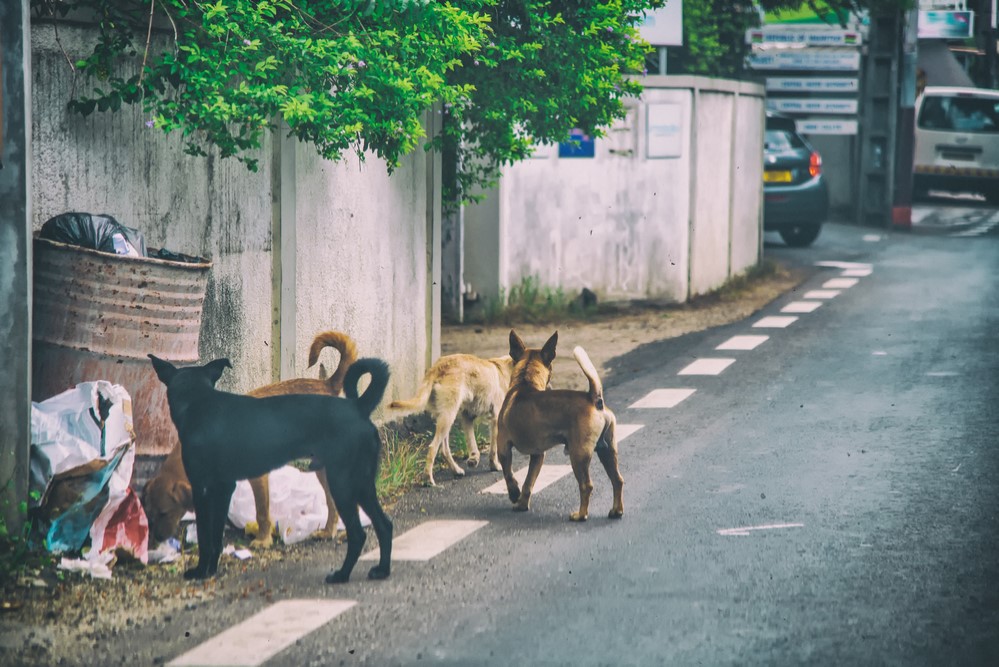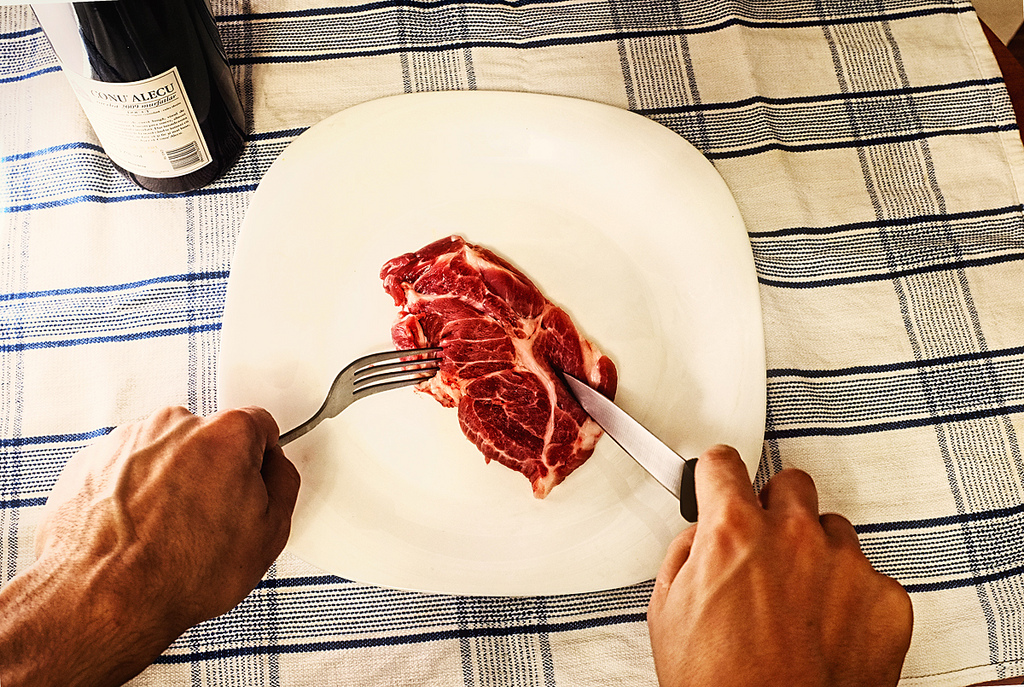We’ve all been there. Walking through the supermarket, you’re suddenly confronted by a refrigerator cabinet full of plastic-wrapped chicken and prepackaged sausage, or the butcher’s display case larded with cuts of marbled beef, richly red. Gazing at these morsels of animal flesh, you recall all of the ethical reasons why you shouldn’t eat meat — meat production violates animals’ rights and ruins the environment. The right thing to do in this situation seems clear: skip the steak and buy lentils instead.
But while the arguments against meat eating present a compelling case for societal-level change to the composition of our diets, it does not quite follow from this that your individual decision to buy a steak is unethical.
Indeed, there is a plausible argument that, notwithstanding the wrongness of meat consumption in the aggregate, there is nothing wrong with individual carnivorous choices. In short, it might not be OK for all of us to eat meat, but it is still OK for any one of us to eat meat. This column will attempt to articulate that argument, with due acknowledgement of its limitations.
The argument’s major premise is a very general claim: faced with the choice to do either A or B, we are morally obligated to do B only if A is, or at least is objectively likely to be, morally worse than B. What makes one choice morally worse than another? It’s beyond the scope of this column to provide an exhaustive answer to that question, but clearly two things that make a choice morally bad are that it causes harm to a person and that it violates a person’s rights. By “person” I mean here an entity worthy of strong moral consideration, which could include animals. So, one choice can be worse than another if the former causes more harm or violates more rights. In addition, it may violate more fundamental rights — think of the difference between the right to life and the right to vote.
It follows from this premise that buying the steak is worse than not buying the steak only if the former is morally worse than the latter. This is the case if buying the steak causes more harm or violates more rights, or more fundamental rights.
The question, then, is whether buying the steak does any of these things.
Let’s consider harm first. Clearly, buying the steak does not cause harm to the cow from which the steak was harvested — that cow no longer exists as a subject capable of feeling pain. Perhaps, however, buying the steak causes harm to presently existing or future cows or the environment, since it sends a signal to meat producers — a signal that would otherwise not have been sent — to produce more meat, and meat producers may respond to that signal by increasing the number of cows they raise and slaughter.
The trouble with this argument is that it is almost surely false. Your sixteen-dollar purchase will have no effect on the meat producers’ decisions, which are influenced only by the aggregate demand of hundreds of thousands or millions of consumers. Furthermore, if you don’t buy the steak, someone else almost certainly will. Thus, even if you choose not to buy the steak, the aggregate demand for steaks almost certainly won’t be reduced even by as little as sixteen dollars — a reduction that, to reiterate, wouldn’t make a difference to meat producers’ market decisions anyway. So, if buying the steak is morally worse than not buying the steak, it isn’t because the former causes more harm than the latter.
The same points apply to the issue of whether buying the steak violates more rights, or more fundamental rights, than not buying the steak.
If killing the cow from which the steak was harvested violated its rights, buying its meat does not cure the violation — but it also adds no new violation. Eating a steak does not constitute a violation of an animal’s right, although it may depend upon it.
And if buying the steak will not cause more harm to present or future cows or the environment because of the insignificance of my individual consumer choices to meat producers’ decisions, neither will it lead to more rights violations.
It appears, then, that buying the steak is not morally worse than not buying the steak. If the major premise is true, it follows from this that you are not morally obligated not to buy the steak. Now for the fun part: answering objections.
First, it may be objected that precisely the same argument can be made with respect to any moral problem that arises due to the aggregate effects of many individual choices. Pollution and unfortunate election outcomes are two obvious examples. Some philosophers are happy to “bite the bullet” here and accept that individuals do not have obligations to behave in ways that would make a difference only if many others followed suit, like voting or refraining from polluting.
Actually, bad election outcomes are quite different from meat consumption in at least one key respect.
In elections, there is no reason to believe that when one person omits to vote, another person, who would not have voted unless the first person made her omission, will vote in that person’s stead. This is unlike when one person chooses not to buy a steak.
In that case another person will very likely buy that very same steak, which she could not have done had the first person bought it.
This distinction is important because it means that any individual’s vote might make a difference to who gets elected — it just has a very, very low likelihood of doing so. However, given the profound consequences of many elections, even that low probability of making a difference arguably makes it likely enough that not voting is morally worse than voting to ground an obligation to vote.
It might be objected here that if the exceedingly small probability of casting the decisive vote is enough to ground an obligation to vote, then the exceedingly small probability of influencing others in some way by not buying the steak is also a sufficient basis for an obligation not to buy the steak. But this objection fails for two reasons. First, voting is only morally required if the election’s outcome is likely to have significant downstream effects. While this is plausible with respect to elections, it is not plausible with respect to the act of not buying the steak. Because someone else will almost surely buy the very steak you omitted to buy, we can safely say that your omission’s influence will be nil. Instead, what can be influential is some further act, such as talking to someone about your choice not to buy a steak.
Nothing I’ve said in this column means that you aren’t morally obligated to perform some other acts that help promote a large-scale shift to vegetarianism if you can. My claim is merely that you aren’t morally obligated not to buy the steak.
Pollution is a more serious problem for my argument, since unlike a single person’s vote, a single person’s quantum of pollution is certainly not going to have a decisive effect on the overall health of the environment. Suppose you are considering whether to dump one day’s worth of garbage in a nearby lake. That amount of garbage may have no perceivable impact on the ecological health of the lake — perhaps not a single organism will or is likely to be affected. That can be the case even if, had the entire city in which you live followed suit, it would have destroyed the lake’s ecology. This seems to imply that dumping your garbage into the lake is not morally worse than refraining from doing so, and so there is no moral obligation for you not to pollute in this way.
However, this conclusion would be overhasty. It might be true that your garbage dumping does not cause ecological harm. But there are other ways in which even a small amount of pollution can have a small, but tangible negative impact. For example, pollution can be an aesthetic affront to people who have a strong interest in enjoying “unspoiled” nature. More importantly, there is another way in which our choices can be morally bad: they can violate rights.
One can violate rights without making the rights-holder worse off in a particular instance. It may plausibly be argued that animals, plants, and even ecosystems have rights not to be polluted at all. This is one way of explaining the intuition many people have that natural ecosystems are in some sense “sacred.”
If that’s so, then even an ecologically insignificant act of pollution may violate those rights, and so may be morally impermissible, despite not making a tangible difference in terms of the well-being or functioning of the affected animals, plants, and ecosystems.
A second objection comes in the form of a question: what if everyone subscribed to the foregoing reasoning? Then the morally bad aggregate effects of meat consumption would be realized. The implication is that the test for whether an individual morally ought to do something is whether the result of everyone doing the very same thing is acceptable. Admittedly, as a sort of quasi-utilitarian sister of Kant’s Formula of Universal Law, as well as a distant cousin of the Golden Rule, this claim belongs to a very illustrious family of moral theories. Apparently, these theories simply deny the major premise of my argument: even if your choice of A over B does not cause more harm or violate more rights, if everyone’s choice of A over B would do so, then your choice is nevertheless wrong.
Philosophers have collectively devoted literally thousands of pages to some version of this disagreement, so I don’t expect to settle it here. Suffice to say that there is something odd about focusing on some hypothetical scenario when considering whether one’s act is morally wrong, rather than on the act’s intrinsic nature and effects.
It is worth emphasizing the limitations of the argument I’ve just defended. As I mentioned, nothing in this argument means that you are not obligated to promote vegetarianism in ways likely to have significant aggregate effects. This means that public officials, public figures, and prominent or influential members of communities likely have stronger obligations to promote vegetarianism than ordinary people. Indeed, since even their omissions may be influential, such people may have obligations to be vegetarians themselves.
In short, the argument I’ve outlined here does not get you off the hook for doing something to help reduce aggregate meat production if you can. And it does not dispute that there are compelling moral reasons for societies to reduce aggregate meat consumption. It simply suggests that you shouldn’t feel too guilt-stricken about your particular consumption choices.





